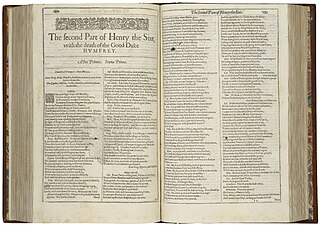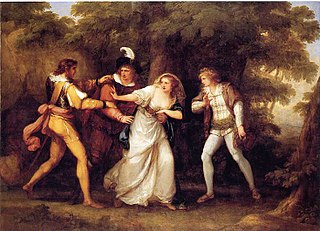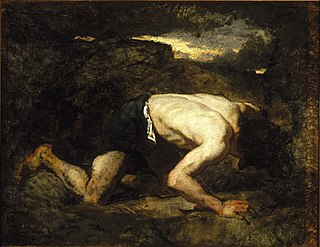
The Oxford Shakespeare is the range of editions of William Shakespeare's works produced by Oxford University Press. The Oxford Shakespeare is produced under the general editorship of Stanley Wells and Gary Taylor.

The Oxford Shakespeare is the range of editions of William Shakespeare's works produced by Oxford University Press. The Oxford Shakespeare is produced under the general editorship of Stanley Wells and Gary Taylor.
Oxford University Press first published a complete works of Shakespeare in 1891. Entitled The Complete Works, it was a single-volume modern-spelling edition edited by William James Craig. [1] [2] This 1891 text is not directly related to the series known as the Oxford Shakespeare today, which is freshly re-edited.
The Oxford Shakespeare, which includes a Complete Works edited by John Jowett, William Montgomery, Gary Taylor and Stanley Wells, appeared in 1986. [3] It includes all of Shakespeare's plays and poems, as well as a biographical introduction. Each work is given a single-page introduction. There are no explanatory notes, but there is a glossary at the back of the book. Two related books accompany the main volume: William Shakespeare: A Textual Companion provides comprehensive data on editorial choices for scholars of the plays, and William Shakespeare: An Old-Spelling Edition presents the plays in their original spelling.
The Oxford Complete Works differs from other Shakespeare editions in attempting to present the text as it was first performed, rather than as it was first printed. This resulted in many controversial choices: for example, presenting Hamlet with several famous speeches relegated to appendices on the grounds that Shakespeare added them after the original performances; presenting two separate texts of King Lear due to the drastic differences between the two extant texts; and changing the name of Falstaff in Henry IV Part One to "Oldcastle" due to historical evidence that this name was used in the first performances even though it never survived to print.
The Oxford Complete Works was the first to emphasize Shakespeare's collaborative work, describing Macbeth , Measure for Measure and Timon of Athens as either collaborations with or revisions by Thomas Middleton; Pericles as a collaboration with George Wilkins; Henry VI Part One as a collaboration with several unknown other dramatists; and Henry VIII and The Two Noble Kinsmen as collaborations with John Fletcher. It also broke with tradition in presenting Shakespeare's works in chronological order, rather than dividing them by genre.
In 2005, a second edition of the Complete Works was produced. It adds a full text of Sir Thomas More (edited by John Jowett), which may contain passages by Shakespeare, and Edward III (edited by William Montgomery), another play believed to be partly by Shakespeare.
The first two editions of the Norton Shakespeare, published by W.W. Norton, were largely based on the Oxford text, but departed from some of its decisions.

The term "Oxford Shakespeare" also refers to Oxford University Press's editions of individual Shakespeare plays and poems. These individual editions follow the same principles as the Complete Works, but their editors are permitted to reject choices made for the Complete Works if they feel strongly; for example, David Bevington's edition of Henry IV Part One uses "Falstaff" not "Oldcastle". The hardback editions feature distinctive purple dustjackets, while the paperbacks follow the design of the Oxford World's Classics editions of classic literature.
The editions were published as follows:
With the publication of Richard II in August 2011, the canonical plays are complete, the only two plays remaining from the one-play-per-volume edition being Edward III and Sir Thomas More .

William Shakespeare was an English playwright, poet and actor. He is widely regarded as the greatest writer in the English language and the world's pre-eminent dramatist. He is often called England's national poet and the "Bard of Avon". His extant works, including collaborations, consist of some 39 plays, 154 sonnets, three long narrative poems, and a few other verses, some of uncertain authorship. His plays have been translated into every major living language and are performed more often than those of any other playwright. Shakespeare remains arguably the most influential writer in the English language, and his works continue to be studied and reinterpreted.

Henry V is a history play by William Shakespeare, believed to have been written near 1599. It tells the story of King Henry V of England, focusing on events immediately before and after the Battle of Agincourt (1415) during the Hundred Years' War. In the First Quarto text, it was titled The Cronicle History of Henry the fift, and The Life of Henry the Fifth in the First Folio text.

Titus Andronicus is a tragedy by William Shakespeare, believed to have been written between 1588 and 1593. It is thought to be Shakespeare's first tragedy and is often seen as his attempt to emulate the violent and bloody revenge plays of his contemporaries, which were extremely popular with audiences throughout the 16th century.

The Life and Death of King John, a history play by William Shakespeare, dramatises the reign of John, King of England, the son of Henry II of England and Eleanor of Aquitaine and the father of Henry III of England. It is believed to have been written in the mid-1590s, but it was not published until 1623, when it appeared in the First Folio.

The Raigne of King Edward the Third, commonly shortened to Edward III, is an Elizabethan play printed anonymously in 1596, and at least partly written by William Shakespeare. It began to be included in publications of the complete works of Shakespeare only in the late 1990s. Scholars who have supported this attribution include Jonathan Bate, Edward Capell, Eliot Slater, Eric Sams, Giorgio Melchiori and Brian Vickers. The play's co-author remains the subject of debate: suggestions have included Thomas Kyd, Christopher Marlowe, Michael Drayton, Thomas Nashe and George Peele.

Henry VI, Part 1, often referred to as 1 Henry VI, is a history play by William Shakespeare—possibly in collaboration with Thomas Nashe and others—believed to have been written in 1591. It is set during the lifetime of King Henry VI of England.

Henry VI, Part 2 is a history play by William Shakespeare believed to have been written in 1591 and set during the lifetime of King Henry VI of England. Whereas Henry VI, Part 1 deals primarily with the loss of England's French territories and the political machinations leading up to the Wars of the Roses, and Henry VI, Part 3 deals with the horrors of that conflict, 2 Henry VI focuses on the King's inability to quell the bickering of his nobles, the death of his trusted adviser Humphrey, Duke of Gloucester, the rise of the Duke of York and the inevitability of armed conflict. As such, the play culminates with the opening battle of the War, the First Battle of St Albans (1455).

Michael Drayton was an English poet who came to prominence in the Elizabethan era, continuing to write through the reign of James I and into the reign of Charles I. Many of his works consisted of historical poetry. He was also the first English-language author to write odes in the style of Horace. He died on 23 December 1631 in London.

Henry IV, Part 1 is a history play by William Shakespeare, believed to have been written not later than 1597. The play dramatises part of the reign of King Henry IV of England, beginning with the battle at Homildon Hill late in 1402, and ending with King Henry's victory in the Battle of Shrewsbury in mid-1403. In parallel to the political conflict between King Henry and a rebellious faction of nobles, the play depicts the escapades of King Henry's son, Prince Hal, and his eventual return to court and favour.
George Wilkins was an English dramatist and pamphleteer best known for his probable collaboration with William Shakespeare on the play Pericles, Prince of Tyre. By profession he was an inn-keeper, but he was also apparently involved in criminal activities.

The Two Gentlemen of Verona is a comedy by William Shakespeare, believed to have been written between 1589 and 1593. It is considered by some to be Shakespeare's first play, and is often seen as showing his first tentative steps in laying out some of the themes and motifs with which he would later deal in more detail; for example, it is the first of his plays in which a heroine dresses as a boy. The play deals with the themes of friendship and infidelity, the conflict between friendship and love, and the foolish behaviour of people in love. The highlight of the play is considered by some to be Launce, the clownish servant of Proteus, and his dog Crab, to whom "the most scene-stealing non-speaking role in the canon" has been attributed.

This article presents a possible chronological listing of the composition of the plays of William Shakespeare.

Timon of Athens is a play written by William Shakespeare and likely also Thomas Middleton in about 1606. It was published in the First Folio in 1623. Timon lavishes his wealth on parasitic companions until he is poor and rejected by them. He then denounces all of mankind, and isolates himself in a cave in the wilderness.

The Shakespeare apocrypha is a group of plays and poems that have sometimes been attributed to William Shakespeare, but whose attribution is questionable for various reasons. The issue is not to be confused with the debate on Shakespearean authorship, which questions the authorship of the works traditionally attributed to Shakespeare.

The Complete Works of William Shakespeare is the standard name given to any volume containing all the plays and poems of William Shakespeare. Some editions include several works that were not completely of Shakespeare's authorship, such as The Two Noble Kinsmen, which was a collaboration with John Fletcher; Pericles, Prince of Tyre, the first two acts of which were likely written by George Wilkins; or Edward III, whose authorship is disputed.

David Martin Bevington was an American literary scholar. He was the Phyllis Fay Horton Distinguished Service Professor Emeritus in the Humanities and in English Language & Literature, Comparative Literature, and the college at the University of Chicago, where he taught since 1967, as well as chair of Theatre and Performance Studies. "One of the most learned and devoted of Shakespeareans," so called by Harold Bloom, he specialized in British drama of the Renaissance, and edited and introduced the complete works of William Shakespeare in both the 29-volume, Bantam Classics paperback editions and the single-volume Longman edition. After accomplishing this feat, Bevington was often cited as the only living scholar to have personally edited Shakespeare's complete corpus.
Like most playwrights of his period, William Shakespeare did not always write alone. A number of his surviving plays are collaborative, or were revised by others after their original composition, although the exact number is open to debate. Some of the following attributions, such as The Two Noble Kinsmen, have well-attested contemporary documentation; others, such as Titus Andronicus, are dependent on linguistic analysis by modern scholars; recent work on computer analysis of textual style has given reason to believe that parts of some of the plays ascribed to Shakespeare are actually by other writers.
Gary Taylor is an American academic, Robert Lawton Distinguished University Professor of English at Florida State University, author of numerous books and articles, and joint editor of The Oxford Shakespeare, The Oxford Middleton, and "The New Oxford Shakespeare."

William Shakespeare (1564–1616) was an English poet and playwright. He wrote approximately 39 plays and 154 sonnets, as well as a variety of other poems.

The Wars of the Roses was a 1963 theatrical adaptation of William Shakespeare's first historical tetralogy, which deals with the conflict between the House of Lancaster and the House of York over the throne of England, a conflict known as the Wars of the Roses. The plays were adapted by John Barton, and directed by Barton and Peter Hall at the Royal Shakespeare Theatre. The production starred David Warner as Henry VI, Peggy Ashcroft as Margaret of Anjou, Donald Sinden as the Duke of York, Paul Hardwick as the Duke of Gloucester, Janet Suzman as Joan la Pucelle, Brewster Mason as the Earl of Warwick, Roy Dotrice as Edward IV, Susan Engel as Queen Elizabeth and Ian Holm as Richard III.